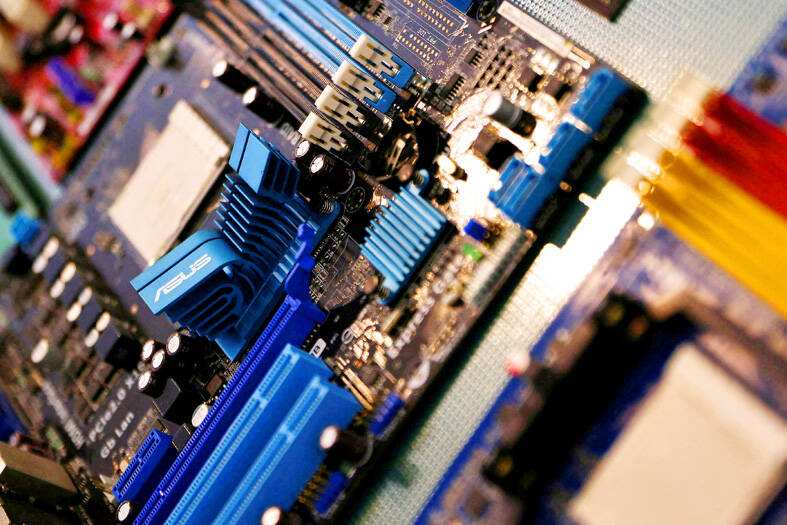Printed circuit board (PCB) maker Compeq Manufacturing Co (華通電腦) has pledged NT$2.5 billion (US$79.6 million) to install new production lines at its plants in Taoyuan after the InvesTaiwan Service Center approved its application to participate in the government program, the Ministry of Economic Affairs said on Friday.
It was Compeq’s second application to be approved since it invested NT$2.5 million in August 2019 to expand production capacity to meet rising demand.
The investment comes as demand from home and overseas markets for high-density interconnect PCBs and advanced PCBs used in satellite communication equipment has continued to grow, the ministry said in a statement.

Photo: Ann Wang, Reuters
“The company is planning its second investment in Taiwan given the increased demand for high-end technology and confidential communication products, as well as consideration of industrial upgrading,” the ministry said.
Compeq is planning to expand smart production lines at its plants in Taoyuan’s Lujhu (蘆竹) and Dayuan (大園) districts, the ministry said.
In addition, the company plans to implement a green energy procurement program and install high-efficiency water recycling equipment at its plants as part of its commitment to sustainable manufacturing, the ministry said.
Compeq, which produces multilayer and double-sided PCBs, last week reported profit for last quarter that was better than expected, as it saw strong handset PCB shipments to a major US brand in the third quarter, while shipments for some notebook computer PCB orders were delayed to last quarter due to Shanghai COVID-19 lockdowns in the second quarter.
Net profit increased 74.5 percent quarter-on-quarter and 60.46 percent year-on-year to NT$2.51 billion, the highest quarterly level in the company’s history, with earnings per share of NT$2.11, the company said in a regulatory filing on Thursday.
Third-quarter revenue was NT$21.69 billion, up 32.81 percent from the previous quarter and an increase of 23.57 percent from a year earlier, also a record high, it said.
In the first three quarters of the year, the company’s revenue rose 28.29 percent year-on-year to NT$55.57 billion, while gross margin improved from 17.61 percent to 19.94 percent over the period.
Net profit in the nine-month period exceeded last year’s full-year level, increasing by 87.58 percent from a year earlier to NT$5.84 billion, with earnings per share of NT$4.9, it said.
Yuanta Securities Investment Consulting Co (元大投顧) analysts said that Compeq’s revenue for this quarter would remain robust as its handset PCB shipments to a major US brand are likely to grow by 5 to 10 percent from last quarter due to seasonal factors, while COVID-19 disruptions at Hon Hai Precision Industry Co’s (鴻海精密) Zhengzhou plant in China had minimal effects on business.
Compeq’s high-end notebook computer PCB shipments to a major US brand are also expected to grow by up to 5 percent from last quarter following the commencement of small volume shipments, Yuanta said in a note on Friday.

With this year’s Semicon Taiwan trade show set to kick off on Wednesday, market attention has turned to the mass production of advanced packaging technologies and capacity expansion in Taiwan and the US. With traditional scaling reaching physical limits, heterogeneous integration and packaging technologies have emerged as key solutions. Surging demand for artificial intelligence (AI), high-performance computing (HPC) and high-bandwidth memory (HBM) chips has put technologies such as chip-on-wafer-on-substrate (CoWoS), integrated fan-out (InFO), system on integrated chips (SoIC), 3D IC and fan-out panel-level packaging (FOPLP) at the center of semiconductor innovation, making them a major focus at this year’s trade show, according

DEBUT: The trade show is to feature 17 national pavilions, a new high for the event, including from Canada, Costa Rica, Lithuania, Sweden and Vietnam for the first time The Semicon Taiwan trade show, which opens on Wednesday, is expected to see a new high in the number of exhibitors and visitors from around the world, said its organizer, SEMI, which has described the annual event as the “Olympics of the semiconductor industry.” SEMI, which represents companies in the electronics manufacturing and design supply chain, and touts the annual exhibition as the most influential semiconductor trade show in the world, said more than 1,200 enterprises from 56 countries are to showcase their innovations across more than 4,100 booths, and that the event could attract 100,000 visitors. This year’s event features 17

EXPORT GROWTH: The AI boom has shortened chip cycles to just one year, putting pressure on chipmakers to accelerate development and expand packaging capacity Developing a localized supply chain for advanced packaging equipment is critical for keeping pace with customers’ increasingly shrinking time-to-market cycles for new artificial intelligence (AI) chips, Taiwan Semiconductor Manufacturing Co (TSMC, 台積電) said yesterday. Spurred on by the AI revolution, customers are accelerating product upgrades to nearly every year, compared with the two to three-year development cadence in the past, TSMC vice president of advanced packaging technology and service Jun He (何軍) said at a 3D IC Global Summit organized by SEMI in Taipei. These shortened cycles put heavy pressure on chipmakers, as the entire process — from chip design to mass

SEMICONDUCTOR SERVICES: A company executive said that Taiwanese firms must think about how to participate in global supply chains and lift their competitiveness Taiwan Semiconductor Manufacturing Co (TSMC, 台積電) yesterday said it expects to launch its first multifunctional service center in Pingtung County in the middle of 2027, in a bid to foster a resilient high-tech facility construction ecosystem. TSMC broached the idea of creating a center two or three years ago when it started building new manufacturing capacity in the US and Japan, the company said. The center, dubbed an “ecosystem park,” would assist local manufacturing facility construction partners to upgrade their capabilities and secure more deals from other global chipmakers such as Intel Corp, Micron Technology Inc and Infineon Technologies AG, TSMC said. It